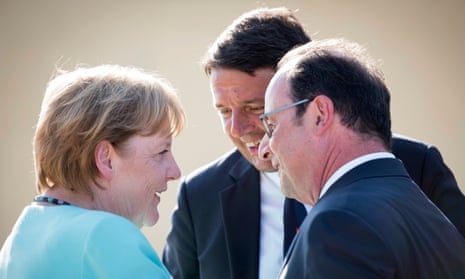The EU may be agreed on its response to Britain’s vote to leave, but on one key question it remains divided: is Brexit masculine or feminine?
In French, Britain’s decision to leave the European Union is known as le Brexit, either – although the Académie Française has yet to rule on the question – because new words in French are almost invariably masculine, or because nouns ending in “t” mostly are (with a few exceptions: la nuit, la forêt, la plupart).
Germany, also, appears to have pretty much decided that der Brexit is a male thing. This might seem odd since several German nouns ending in “it” (das Fazit, meaning conclusion, das Dynamit, dynamite) are neither masculine nor feminine, but neuter.
But as any German learner knows, what makes a noun feminine, masculine or neuter in German is somewhat less clear than in Latin languages. Der Brexit may be inspired – perhaps unwisely – by the equally masculine der Profit, or more likely by the fact that the German word for exit, der Austritt, is masculine.
Spain, too, has plumped for el Brexit, like most English loan words that become masculine by default in Spanish. That’s because they rarely end in “o” (generally masculine) or “a” (generally feminine) like most Spanish nouns, and given the choice, Spain, being a Latin country, opts for male.
Italy, for the time being at least, is resisting the trend – and its language police, the Accademia della Crusca, has published a fabulously lengthy explanation as to why. Debating whether Italians should say plain Brexit (without a preceding article), il Brexit or la Brexit, the academy finds firmly in favour of the last.
“It seems preferable to make Brexit feminine,” it said, “since etymologically, the component exit has a corresponding Italian noun, ‘uscita’”, which is feminine. Moreover, it adds, use of a preceding article would be in line with other loan words describing “real or hypothetical events ... indicating complex scenarios”, such as la perestrojka and il global warming.
As with most things in Europe, France and Germany, once agreed, are likely to end up on the winning side in the Brexit gender war, as the former Labour Europe minister Denis MacShane observed in a tweet. Britain, for its part, will doubtless hope for more disunity once the real Brexit battle starts.
Breaking. France and Germany have decided Brexit is masculine. Le Brexit. Der Brexit.
— Denis MacShane (@DenisMacShane) October 19, 2016

Comments (…)
Sign in or create your Guardian account to join the discussion